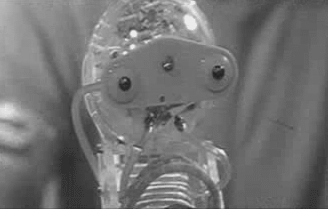Right now the intrusion of Digital Age surveillance is still (mostly) external to our bodies, though computers have shrunk small enough to slide into our pockets. If past is prologue, the future progression would move this hardware inside ourselves, the way pacemakers for the heart were originally exterior machines until they could fit in our chests. Even if no such mechanisms were necessary and we manipulated health, longevity, appearance and longevity though biological means, the thornier ethical questions would probably remain.
A month ago, I published a post about Eve Herold’s new book, Beyond Human, when the opening was excerpted in Vice. Here’s a piece from “Transhumanism Is Inevitable,” Ronald Bailey’s review of the title in the Libertarian magazine Reason:
Herold thinks these technological revolutions will be a good thing, but that doesn’t mean she’s a Pollyanna. Throughout the book, she worries about how becoming ever more dependent on our technologies will affect us. She foresees a world populated by robots at our beck and call for nearly any task. Social robots will monitor our health, clean our houses, entertain us, and satisfy our sexual desires. Isolated users of perfectly subservient robots could, Herold cautions, “lose important social skills such as unselfishness and the respect for the rights of others.” She further asks, “Will we still need each other when robots become our nannies, friends, servants, and lovers?”
There is also the question of how centralized institutions, as opposed to empowered individuals, might use the new tech. Behind a lot of the coming enhancements you’ll find the U.S. military, which funds research to protect its warriors and make them more effective at fighting. As Herold reports, the Defense Advance Research Projects Agency (DARPA) is funding research on a drug that would keep people awake and alert for a week. DARPA is also behind work on brain implants designed to alter emotions. While that technology could help people struggling with psychological problems, it might also be used to eliminate fear or guilt in soldiers. Manipulating soldiers’ emotions so they will more heedlessly follow orders is ethically problematic, to say the least.
Similar issues haunt Herold’s discussion of the technologies, such as neuro-enhancing drugs and implants, that may help us build better brains. Throughout history, the ultimate realm of privacy has been our unspoken thoughts. The proliferation of brain sensors and implants might open up our thoughts to inspection by our physicians, friends, and family—and also government officials and corporate marketers.
Yet Herold effectively rebuts bioconservative arguments against the pursuit and adoption of human enhancement.•


